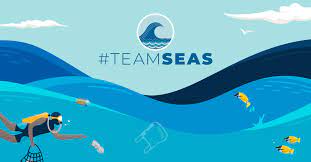#TeamSeas

https://teamseas.org/
December 12, 2021
I am sure the more internet-savvy students among us have caught wind of a recent fundraising project referred to as #TeamSeas, the project in question being a massive fundraiser to remove 30,000,000 tons of garbage from our collective oceans across the globe.
The water supply of our planet is extremely important, and although it is easy to stare at the beautiful blue mass off the coast and think of how infinitely deep and far it goes, very little of that water is truly safe for humans to consume and use in production. “Rivers and lakes often overlap political boundaries, making it difficult to figure out who owns what. When several groups share a common water source, disagreements and misunderstandings can happen, especially if one group tries to claim a bigger share of the water than the others.”1 However, although it’s easy to blame wasteful people in more developed countries [and that’s certainly a cause, the average American uses 575 liters (about twice the volume of a bathtub) of water every day] approximately 70% of the water we use goes to agriculture, where a quite small percentage will actually reach the soil.
The increase of pH in the oceans is dangerous and can prevent corals and other marine life, such as therapods, from building their structures and shells, leaving them more vulnerable to predators and setting their populations, and all those that rely on them, on a downward trajectory towards endangerment and extinction.
Both Climate Change and Ocean acidification’s main cause is the increase of CO2 and other greenhouse gases in the atmosphere. However, there are many things we can do to mitigate the situation. The solution most are aware of is cutting down on the amount of energy we use that is produced via the burning of fossil fuels such as coal and oil. Different and less wasteful agricultural techniques can be utilized to decrease that incredible 70%. We can focus on domesticated animals with a low feed to nutrition value to decrease the amount of crop that must go to feeding pasture animals. And on an individual basis, we can recycle as often as we can and save water and energy when we don’t need it.
“By 2025 more than half of the world’s nations will face significant shortages of fresh water.” If everyone uses just a little bit less energy, a little bit less water, that will compile to become a big difference. One that may just – Change the World.
Sources:

Thomas Peri • Dec 15, 2021 at 9:34 pm
Julia, thanks for this. An awesome cause and the oceans have no borders – a cause fit for Global Citizens!